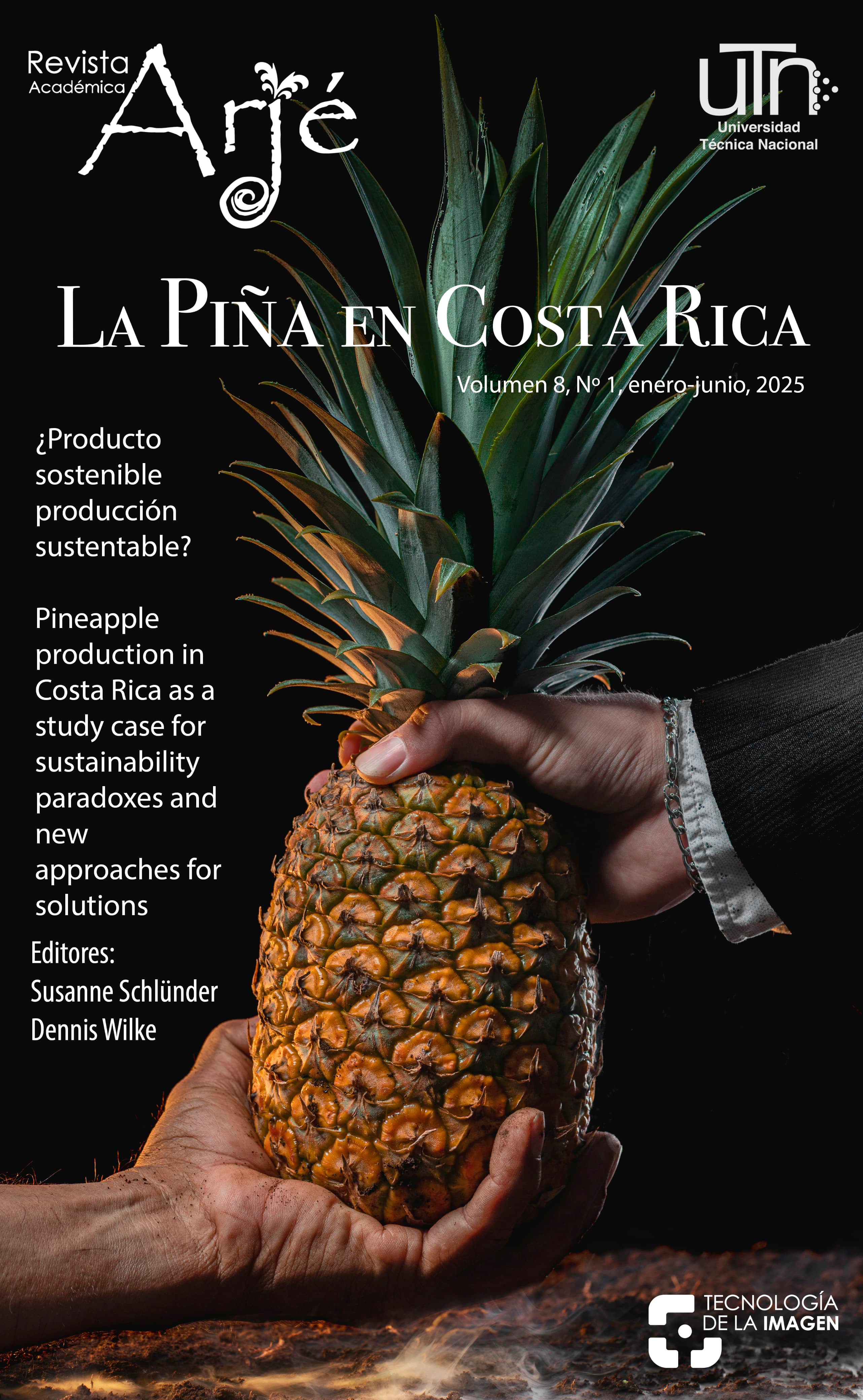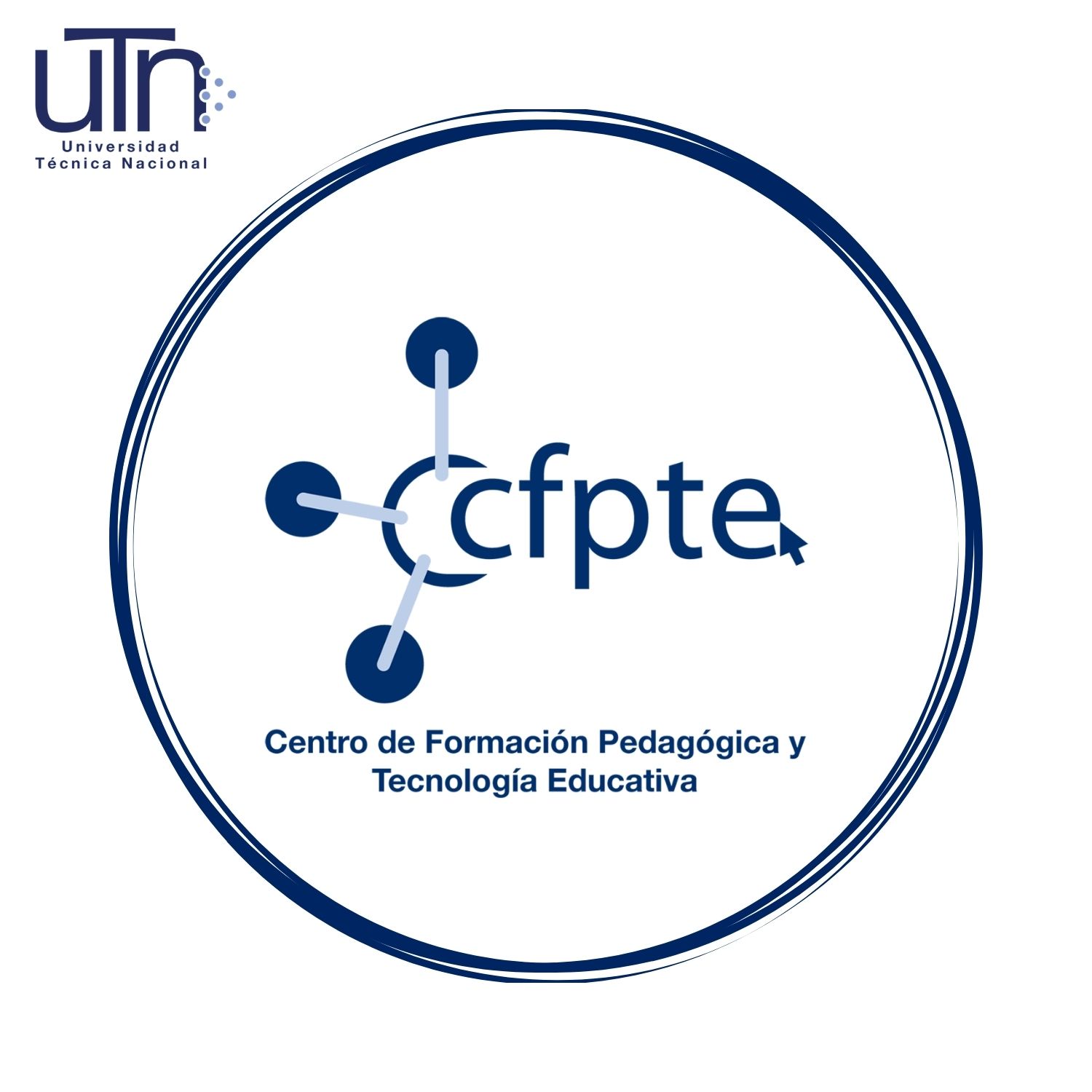Introduction
DOI:
https://doi.org/10.47633/d2fwry34Keywords:
Environmental education, Pineapple cultivation, Costa Rica, Agrochemicals, EnvironmentAbstract
This issue of Arjé focuses on the contradictions in the dominant sustainability paradigm, using pineapple production in Costa Rica as an example. It seeks to respond to the implications of a weak concept of sostenibilidad by bringing together contributions that address the sustainability paradoxes from an interdisciplinary perspective, but also explore new environmental practices that, like the IPBES framework (Díaz et al., 2015), incorporate local knowledge and other epistemologies. The aim is to question the economic foundations of sustainability thinking and to outline alternative approaches, i.e. the contributions not only strive to uncover contradictions and aporias, but also try to formulate future perspectives and propose solutions.
The authors are members of the Universidad Técnica Nacional and the University of Osnabrück and are collaborating within the framework of the DAAD-funded project “Transformative Research and Capacity Building in the Education Sector to Protect Livelihoods and Biodiversity in Costa Rica”. As the complex and all-encompassing interrelationships that dominate the sustainability paradigm require a holistic understanding, the articles in this issue will take a multidisciplinary approach that crosses sectoral boundaries, combining different perspectives from the social, environmental, political, cultural and literary sciences on how national pineapple production contradicts the country’s sustainable reputation.
Downloads
References
Aguilar Aguilar, R., García Espinosa, S., & García-Rojas, H. R. G. (2021). La trayectoria semántica de la Sustentabilidad. Sostenibilidad Económica Social y Ambiental, 3, 63–75. https://doi.org/10.14198/sostenibilidad2021.3.04
Bendell, J. (2022). Replacing Sustainable Development: Potential Frameworks for International Cooperation in an Era of Increasing Crises and Disasters. Sustainability, 14(13), 1–19. https://doi.org/10.3390/su14138185
Blanco-Obando, E. E. (2020). Cultivo de piña y conflictos socio-ambientales en la región Atlántico/Caribe, Costa Rica, 1990-2017. Athenea Digital, 20(3), 1–23. https://doi.org/10.5565/rev/athenea.2421
Díaz Balteiro, L. (Ed.). (2008). Caracterización de la industria forestal en España: Aspectos económicos y ambientales. Fundación BBVA.
Díaz, S., Demissew, S., Carabias, J., Joly, C., Lonsdale, M., Ash, N., Larigauderie, A., Adhikari, J. R., Arico, S., Báldi, A., Bartuska, A., Baste, I. A., Bilgin, A., Brondizio, E., Chan, K. M. A., Figueroa, V. E., Duraiappah, A., Fischer, M., Hill, R., . . . Zlatanova, D. (2015). The IPBES Conceptual Framework — connecting nature and people. Current Opinion in Environmental Sustainability, 14, 1–16. https://doi.org/10.1016/j.cosust.2014.11.002
Cantú-Martínez, P. C. (2012). El Axioma del Desarrollo Sustentable. Revista de Ciencias Sociales, (137), 83–91. https://doi.org/10.15517/rcs.v0i137.8420
Del Monte. (2021). A brighter World tomorrow, 2021 Sustainability Report. Retrieved September 14, 2023, from https://freshdelmonte.com/wp-content/uploads/2022/10/FDM_2021_SustainabilityReportFINAL.pdf
Esencial Costa Rica. (2024). Retrieved November 11, 2024, from https://www.esencialcostarica.com
Escobar, A. (1995). Encountering development: The making and unmaking of the Third World. Princeton University Press.
GRUTA. (2017). Costa Rica: Expansión del capitalismo en el campo y sus estrategias territoriales. Grupo de Estudios Agrarios, UCR.
Gutiérrez-Arguedas, A. & Granados-Chaverri, C. (2020). Nacionalismo, Frontera y Excepcionalismo Verde en Costa Rica. Anuario de Estudios Centroamericanos (46), 1–28. https://doi.org/10.15517/AECA.V46I0.43807
Harvard’s Growth Lab. (2021). “Costa Rica”; “Pineapple”. Atlas of Economic Complexity. Retrieved May 20, 2024, from https://atlas.cid.harvard.edu/e?country=52&queryLevel=location&product=undefined&year=2021&productClass=HS&target=Product&partner=undefined&startYear=undefined
Herrera Rodríguez, M. (2013). Sustainable Development in Costa Rica: A Geographic Critique. Journal of Latin American Geography, 12(2), 193–219. https://doi.org/10.1353/lag.2013.0011
Instituto Costarricense de Electricidad. (2020). Costa Rica: Matriz eléctrica. Modelo sotenible. Único en el mundo. Retrieved December 12, 2023, from https://www.grupoice.com/wps/wcm/connect/19b209b1-049b-4cb4-bf4f-ca7170ce2749/Matriz+eléctrica+2020.pdf?MOD=AJPERES&CACHEID=ROOTWORKSPACE-19b209b1-049b-4cb4-bf4f-ca7170ce2749-o6SDoG0
Isla, A. (2015). Greening Costa Rica: The Political Ecology of Sustainable Development. In R. C. Mitchell & S. A. Moore (Eds.), Planetary Praxis & Pedagogy. Transdisciplinary Approaches to Environmental Sustainability, (pp. 73–94). Sense Publishers. https://doi.org/10.1007/978-94-6300-214-1_4
Kifah, S., & Andraka, S. (n.d.). Costa Rica: Sustainable Pineapple. Retrieved September 14, 2023, from https://www.undp.org/facs/costa-rica-sustainable-pineapple
León-Araya, A. (2021). Agrarian extractivism and Sustainable Development. The politics of pineapple expansion in Costa Rica. In B M. McKay, A. Alonso-Fradejas, & A. Ezquerro-Cañete (Eds.), Agrarian Extractivism in Latin America (pp. 99–116). Routledge. https://doi.org/10.4324/9780367822958
Maglianesi-Sandoz, M. A. (2013). Desarrollo de las Piñeras en Costa Rica y sus Impactos sobre Ecosistemas Naturales y Agro-Urbanos. Biocenosis, 27(1-2), 62–70. https://revistas.uned.ac.cr/index.php/biocenosis/article/view/611
Mariño-Jiménez, J. P., Flores-Gamboa, S., & Bonilla Rubiano, J. M. (2018). Sostenibilidad versus Sustentabilidad: Una propuesta integradora que desvirtúa su uso homólogo. Opción, 34(87), 1391–1422.
Meadows, D. H., Meadows, D. L., Randers, J., & Behrens, W. (1972). Los límites del crecimiento: informe al Club de Roma sobre el predicamento de la humanidad (4ª ed.). Fondo de Cultura Económica.
Ministerio de Ambiente, Energía y Telecomunicaciones. (2015). Política Nacional de Biodiversidad 2015-2030 Costa Rica. Retrieved December 20, 2023, from https://enbcr.go.cr/sites/default/files/politica-biodiversidad-cr.pdf
Ministro de Ambiente, Energía y Telecomunicaciones, Sistema Nacional de Áreas de Conservación, Comisión Nacional para la Gestión de la Biodiversidad & Fondo Nacional de Financiamiento Forestal. (2018). Resumen del Sexto Informe Nacional de Costa Rica ante el Convenio de Diversidad Biológica. Programa de Naciones Unidas para el Desarrollo – Apoyo técnico para que las Partes Elegibles desarrollen el Sexto Informe Nacional para el CDB (6NR-LAC) Costa Rica. Retrieved December 20, 2023, from https://chmcostarica.go.cr/recursos/documentos-y-publicaciones/resumen-vi-informe-de-costa-rica-al-convenio-de-diversidad
Monge-Hernández, C. (2015). Desarrollo sostenible a la tica: geopolítica y ambiente en la Administración Figueres Olsen (1994-1998). Revista Rupturas, 5(1), 1–21. https://doi.org/10.22458/rr.v5i1.712
Morataya-Montenegro, R., & Bautista-Solís, P. (2020). Water Governance and Adaptation to Drought in Guanacaste, Costa Rica. In E. Oliveira Vieira, S. Sandoval-Solís, V. Albuquerque Pedrosa & J. P. Ortiz-Partida (Eds.), Integrated Water Resource Management (pp. 85–100). Springer International Publishing. http://hdl.handle.net/11056/23508
Programa Estado de la Nación. (2014). XIX Informe Estado de la Nación en Desarrollo Humano Sostenible. https://estadonacion.or.cr/?informes=informe-2014
Real Academia Española. (2023). Sustentable. En Diccionario de la Real Academia Española. https://dle.rae.es/sustentable
Ramírez-Cover, A. (2020). Excepcionalismo verde y desarrollo sostenible en Costa Rica. Anuario del Centro de Investigación y Estudios Políticos, (11), 1–21. https://doi.org/10.15517/aciep.v0i11.44774
Rivera-Hernández, J. E., Blanco-Orozco, N. V., Alcántara-Salinas, G., Houbron, E. P., & Pérez-Sato, J. A. (2017). ¿Desarrollo sostenible o sustentable? La controversia de un concepto. Posgrado y Sociedad. Revista Electrónica del Sistema de Estudios de Posgrado, 15(1), 57–67. https://doi.org/10.22458/rpys.v15i1.1825
Rostow, W. W. (1956). The take-off into self-sustained Growth. The Economic Journal, 66(261), 25–48.
Sachs, I. (1977). Eco-Development: Meeting Human Needs. India International. Centre Quarterly, 4(4), 337–350.
Sachs, W. (1991). Environment and development: the story of a dangerous liaison. Ecologist, 21(6), 252–252.
Sachs, W. (2000). Development. The rise and decline of an ideal (Wuppertal Papers 108). Wuppertal Institut für Klima, Umwelt, Energie, Wuppertal. https://nbn-resolving.de/urn:nbn:de:bsz:wup4-opus-10782
Santamarina, B., Vaccaro, I., & Beltrán, O. (2015). The Sterilization of Eco-Criticism: From Sustainable Development to Green Capitalism. Anduli, (14), 13–28. http://dx.doi.org/10.12795/anduli.2015.i14.01
Schmieder, F. (2010). Die Krise der Nachhaltigkeit. Zur Kritik der politischen Ökologie. Peter Lang.
The Earthshot Prize. (2021). London 2021 Awards. Retrieved November 11, 2024, from https://earthshotprize.org/the-prize/london-2021/
United Nations Development Programme. (n.d.). Country Factsheet. Costa Rica Pineapples. Retrieved May 30, 2024, from https://www.undp.org/sites/g/files/zskgke326/files/migration/gcp/COSTA-RICA-PINEAPPLES.pdf
Wanner, T. (2015). The New ‘Passive Revolution’ of the Green Economy and Growth Discourse: Maintaining the ‘Sustainable Development’ of Neoliberal Capitalism. New Political Economy, 20(1), 21–41. https://doi.org/10.1080/13563467.2013.866081
Downloads
Published
Issue
Section
License
Copyright (c) 2025 Susanne Schlünder, Karoline Schmidt, Dennis Wilke

This work is licensed under a Creative Commons Attribution-NonCommercial-ShareAlike 4.0 International License.
All articles in the Revista Académica Arjé are published under the Creative Commons Attribution-NonCommercial-ShareAlike 4.0 International License (CC BY-NC-SA 4.0).
This means that:
-
Attribution: Proper credit must be given to the original authors, a link to the license must be included, and any changes made must be indicated.
-
NonCommercial: The material may not be used for commercial purposes.
-
ShareAlike: If the work is adapted or remixed, the resulting version must be distributed under the same license.
More information at: https://creativecommons.org/licenses/by-nc-sa/4.0/deed.en











